
Back in 1982, I had an employer who was genuinely concerned for my obvious drinking and drug problem and how it affected my job. He had legitimate concern for me and so one day he took me to a mental health clinic in Las Vegas to have me see a psychiatrist. After a session with the psychiatrist, he diagnosed me with OCD also known as obsessive-compulsive disorder. His prognosis was I would never get better. I think a high percentage of people suffering from addiction have an OCD component. Obsessive Compulsive Disorder is a disorder in which people have recurring, unwanted thoughts, ideas or obsessions that make them feel driven to do something repetitively. Prior to a compulsive desire to drink and use drugs or engage in other negative behavior this disorder can be the nucleus for negative behavior. It seems that the obsession needs to be acted upon in order to find some relief for the obsessive and compulsive need. OCD is bad enough, but when you add the progression that is brought on by tolerance and chronic addiction occurs, you now have a compounded psychological compulsion.
The cycle between increased addiction to alcohol and drugs and the ensuing depression that was brought on by a growing obsessive-compulsive disorder led to a deepening of my depression. As my depression increased it brought on and increased need to drown out the depression by drinking and using more drugs. It was not surprising that the psychiatric prognosis was so negative. Unfortunately, I was not able to be treated nor did I want to be treated for my diagnosed condition. I was in such a state of rebellious denial that I was far from admitting I had a problem and certainly not a problem as so seriously diagnosed. The fact that my depression or my addiction or the combination of the two did not kill me still baffles me to this day. Upon further study, I realized most people die as a result of OCD leading to substance abuse. Today as a sober person, I often recognize some patterns of my OCD. I have learned how to cope with them by reasoning with myself while learning how not to react. Today in my managed condition, I respond and act. Did OCD bring on my addiction or did my substance-abuse addiction bring on my OCD? I am not sure I will ever know. I am not even sure if I care. What I do know is that most people of addiction have secondary clinical diagnosis and many people who start with such a clinical diagnosis develop a substance addiction. There is a way out for all of us. The first thing we must do is cease from all forms of alcohol and drugs and seek treatment to manage the obsessive- compulsive disorder
I wish you well on your journey of recovery. If there is anything I can do to assist you along your way, please reach out to let me know.
